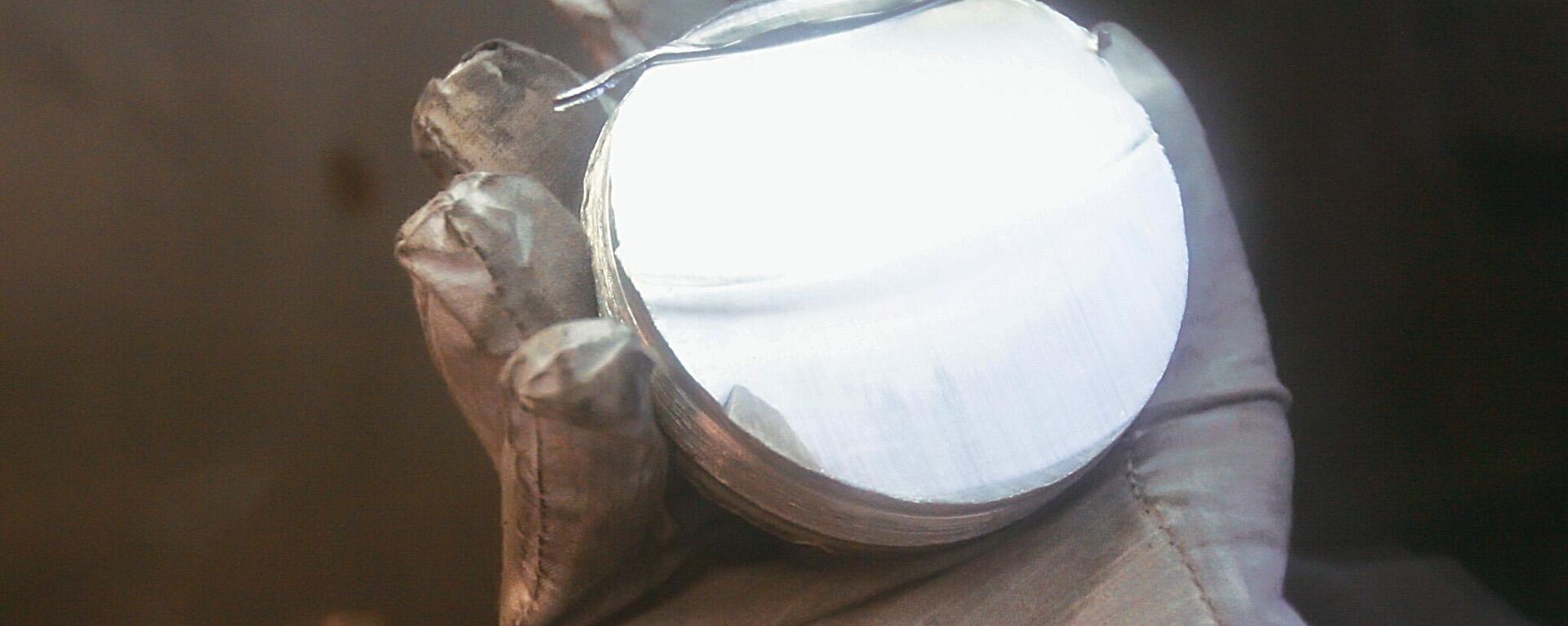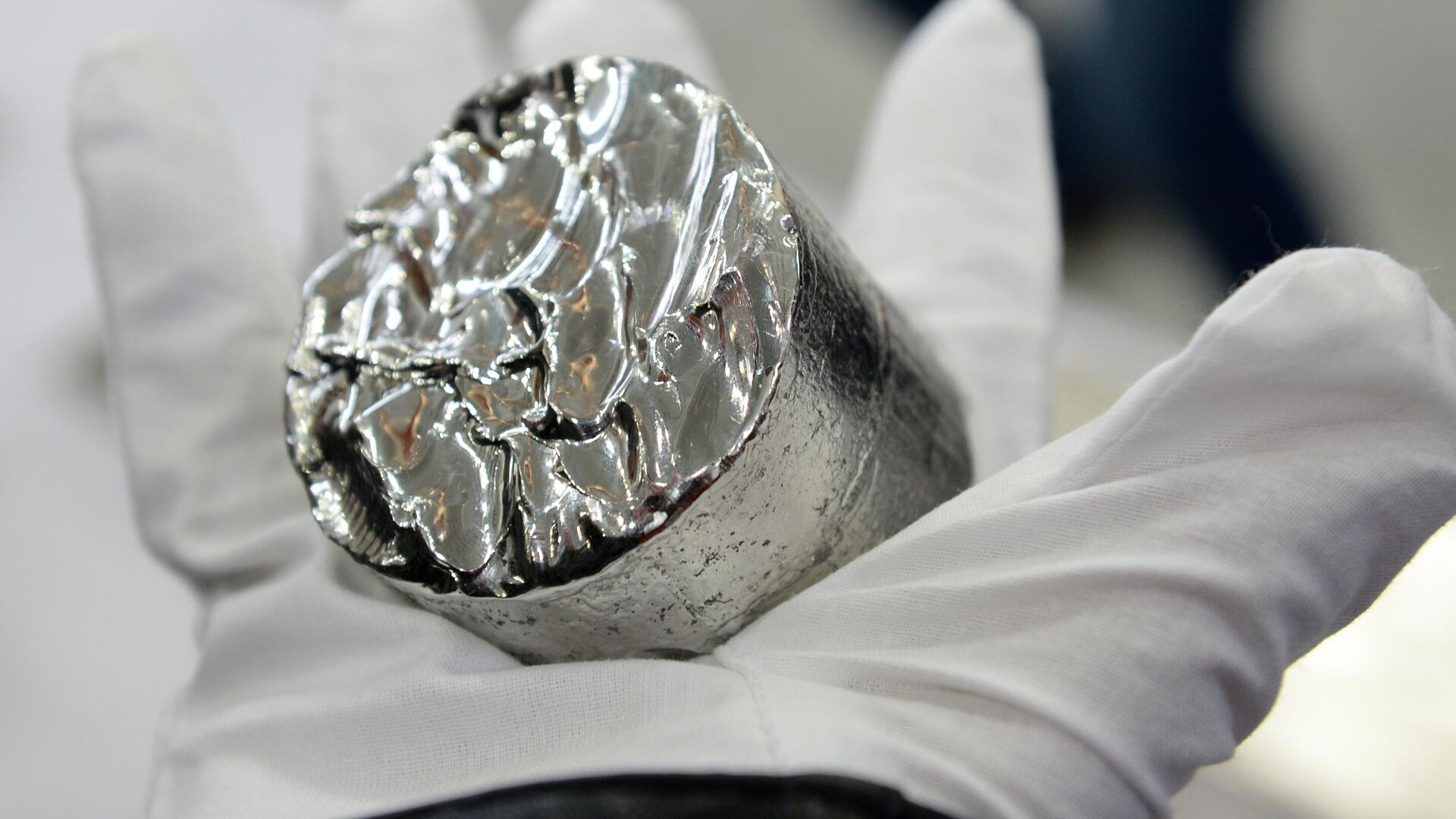https://sputnikglobe.com/20240504/cold-war-consequences-us-scrambles-for-rare-earth-magnets-produced-in-china-1118258840.html
Cold War Consequences: US Scrambles for Rare-Earth Magnets Produced in China
Cold War Consequences: US Scrambles for Rare-Earth Magnets Produced in China
Sputnik International
US legislation banning the use of rare-earth magnets produced in China is creating a major challenge for weapons manufacturers, EV makers, and various other industries.
2024-05-04T23:19+0000
2024-05-04T23:19+0000
2024-05-04T23:19+0000
military & intelligence
donald trump
augusto pinochet
bill clinton
china
general motors
f-35
rare-earth metals
magnets
neoliberalism
https://cdn1.img.sputnikglobe.com/img/07e7/0c/15/1115728170_0:210:2897:1840_1920x0_80_0_0_476d4905c206b0b444e1a6d414328633.jpg
A 2018 law passed during the height of former US President Donald Trump’s trade war with China is causing major headaches for America’s defense industry.The dictate prohibits the use of so-called rare-earth magnets made in China in US military equipment. The powerful magnets, produced from exotic metals like neodymium, europium, and yttrium, are prized for their strength and used in everything from drones and nuclear submarines to F-35 jets and missile-guidance systems.But the vast majority of them are produced in China, and still more contain materials mined or processed in the country. Trump’s law would ban the use of all such magnets by the US defense industry by 2027, leaving arms manufacturers with an insufficient global supply to meet current needs.The inability of the United States and allied countries to achieve self-sufficiency in production of rare-earth magnets is a case study of the effects of decades of Western economic policy.In the United States, neoliberalism has been a bipartisan project. The term first emerged in the 1980s as Chilean dictator Augusto Pinochet, under advisement from Milton Friedman and other Western economists, implemented legislation designed to reverse the gains of the country’s labor movement. Pinochet’s military junta instituted mass privatization, deregulation, and government austerity, presiding over a 45-hour workweek.Former President Bill Clinton’s election in 1992 marked the ascension of a Democratic Party more fixated on social issues than the economic concerns of its historical blue collar base, and neoliberalism continued unabated. Decades of deindustrialization followed.Meanwhile, Chinese state-run enterprises built the foundations of the country’s modern-day dominance in heavy industry. One such company formed part of an investment group that acquired Magnequench, a magnet producer formerly owned by US automaker General Motors. The US government approved the deal.Now, Washington lawmakers who previously embraced neoliberalism are second-guessing the offshoring of crucial technology to a country increasingly portrayed as a threat. But years of corporate and government policy is not easily reversed, and the Biden administration has resorted to desperate measures to halt the trend.Hundreds of millions of dollars in grants and tax credits have been extended to lure magnet producers back to the United States, raising the threat of inflation and further government indebtedness. Observers note the US currently lacks the skilled workers necessary to resurrect the industry, requiring the import of talent or the sending of employees abroad for training, further ballooning costsOne German company estimates its magnets will be 50% more expensive than Chinese counterparts. The cost could force the US military to settle for fewer jets, submarines, and weapons systems than it would like to purchase.Still the United States is attempting to turn the tide, producing crucial components without the involvement of the 21st century’s global workshop.
https://sputnikglobe.com/20231013/rare-earths-miner-european-ev-industry-cant-compete-with-china-without-subsidies-1114179499.html
https://sputnikglobe.com/20230801/chinas-rare-earths-ban-may-sink-us-microchip-manufacturing-ambitions-1112322954.html
https://sputnikglobe.com/20230120/macron-unveils-massive-military-expansion-plan-amid-nationwide-strike-over-neoliberal-budget-cuts-1106535489.html
china
Sputnik International
feedback@sputniknews.com
+74956456601
MIA „Rosiya Segodnya“
2024
John Miles
https://cdn1.img.sputnikglobe.com/img/07e8/01/19/1116388787_0:0:1316:1316_100x100_80_0_0_77e70d36afd983012b1c5d38ddb84156.jpg
John Miles
https://cdn1.img.sputnikglobe.com/img/07e8/01/19/1116388787_0:0:1316:1316_100x100_80_0_0_77e70d36afd983012b1c5d38ddb84156.jpg
News
en_EN
Sputnik International
feedback@sputniknews.com
+74956456601
MIA „Rosiya Segodnya“
Sputnik International
feedback@sputniknews.com
+74956456601
MIA „Rosiya Segodnya“
John Miles
https://cdn1.img.sputnikglobe.com/img/07e8/01/19/1116388787_0:0:1316:1316_100x100_80_0_0_77e70d36afd983012b1c5d38ddb84156.jpg
rare-earth magnets, rare-earth minerals, china rare-earth magnets, 2018 us law rare-earth magnets, rare-earth magnets us defense, us neoliberal deindustrialization, us neoliberalism, us outsourcing, us deindustrialization, us globalization, us-china trade, trading minirals, trade minirals
rare-earth magnets, rare-earth minerals, china rare-earth magnets, 2018 us law rare-earth magnets, rare-earth magnets us defense, us neoliberal deindustrialization, us neoliberalism, us outsourcing, us deindustrialization, us globalization, us-china trade, trading minirals, trade minirals
Cold War Consequences: US Scrambles for Rare-Earth Magnets Produced in China
US legislation banning the use of crucial components produced in China is creating a major challenge for weapons manufacturers, EV makers, and various other industries.
A 2018 law passed during the height of former US President Donald Trump’s trade war with China is causing major headaches for America’s defense industry.
The dictate prohibits the use of so-called rare-earth magnets made in China in US military equipment. The powerful magnets,
produced from exotic metals like neodymium, europium, and yttrium, are prized for their strength and used in everything from drones and nuclear submarines to F-35 jets and missile-guidance systems.
But the vast majority of them are produced in China, and still more contain materials mined or processed in the country. Trump’s law would ban the use of all such magnets by the US defense industry by 2027, leaving arms manufacturers with an insufficient global supply to meet current needs.
“We’re talking about a Western-world supply chain that basically doesn’t exist,”
said James Litinsky, CEO of the company MP Materials.
The inability of the United States and allied countries to achieve self-sufficiency in production of rare-earth magnets is a case study of the effects of decades of Western economic policy.

13 October 2023, 19:24 GMT
In the United States, neoliberalism has been a bipartisan project. The term first
emerged in the 1980s as Chilean dictator Augusto Pinochet, under advisement from Milton Friedman and other Western economists, implemented legislation designed to reverse the gains of the country’s labor movement. Pinochet’s military junta instituted mass privatization, deregulation, and government austerity, presiding over a 45-hour workweek.
The Republican Party, on behalf of business interests who had long chafed under the power and influence of trade unions, sought to implement similar policy. Globalization and outsourcing allowed companies to ship thousands of jobs overseas to countries with lower pay and fewer regulations, breaking the back of the US labor movement.
Former President Bill Clinton’s election in 1992 marked the ascension of a Democratic Party more fixated on social issues than the economic concerns of its historical blue collar base, and neoliberalism continued unabated. Decades of deindustrialization followed.
Meanwhile, Chinese state-run enterprises built the foundations of the country’s modern-day dominance in heavy industry. One such company formed part of an investment group that acquired Magnequench, a magnet producer formerly owned by US automaker General Motors. The US government approved the deal.
“I built my own gallows,” said Mitchell Spencer, an engineer with the company who trained Chinese workers at a manufacturing plant in the city of Tianjin.
Now, Washington lawmakers who previously embraced neoliberalism are second-guessing the offshoring of crucial technology to a country increasingly portrayed as a threat. But years of corporate and government policy is not easily reversed, and the Biden administration has resorted to desperate measures to halt the trend.
Hundreds of millions of dollars in grants and tax credits have been extended to lure magnet producers back to the United States, raising the threat of inflation and further government indebtedness. Observers note the US currently lacks the skilled workers necessary to resurrect the industry, requiring the import of talent or the sending of employees abroad for training, further ballooning costs
One German company estimates its magnets will be 50% more expensive than Chinese counterparts. The cost could force the US military to settle for fewer jets, submarines, and weapons systems than it would like to purchase.
Still the United States is attempting to turn the tide, producing crucial components without the involvement of the 21st century’s global
workshop.

20 January 2023, 17:51 GMT








